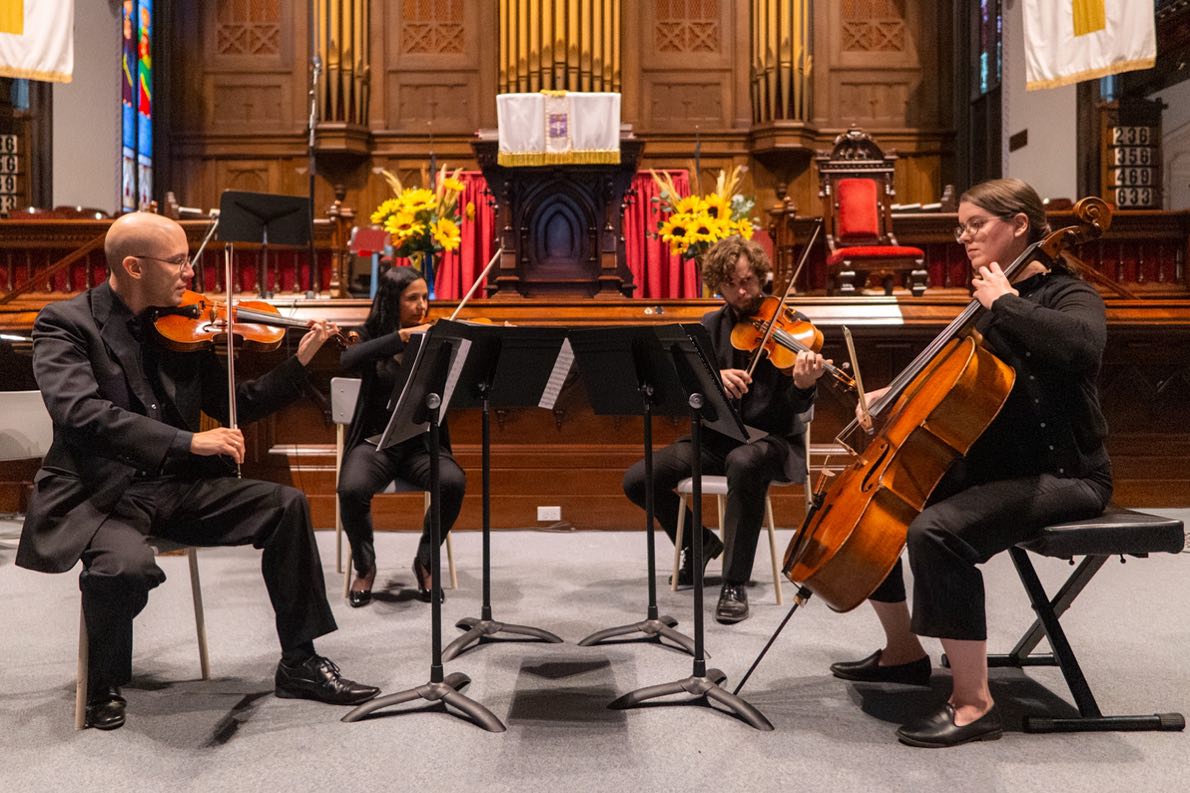The Elm City String Quartet played its first hometown show of the season on September 29 performing music by Mozart and Tchaikovsky at Wilmot United Church.

Matt Carter
It was a different experience, hustling across town on my bike to make it to a 7:30 show…in late September…before dark. I could get used to that.
September 29 was my live introduction to the Elm City String Quartet as they kicked off their second season with music by Mozart and Tchaikovsky performed before a hometown audience at Fredericton’s Wilmot United Church. I was invited to attend the show and thought I would return the gesture by writing about the performance. I just had to figure out the best way to do it.
Live performance reviews are something I’ve always wrestled with. I could write about a new album or a new single all day, but a live show is a very different animal. I have always gone back and forth on the value of writing concert reviews. I have thought about it a lot. Believe me. And I’ve come to the conclusion that yes, there is some value in writing about a live show. Concert reviews are a way for writers to support performers beyond just talking about their recorded output. It also helps the venue by way of encouraging potential audiences to come out and create their own experiences. Lastly, a concert review or any other kind of performing arts recap can serve to remind the broader community of the benefits that come with attending live performances. If a review can encourage one person to leave their home and experience something new, that’s important. That’s a win in my books.
Which brings us back to Elm City String Quartet’s performance, and the challenge I faced by committing to write about the show. Most of the concert reviews I have written were all focused on bands playing rock music. But as I would learn while jotting down notes from my seat in the eight row pew, writing about a string quartet’s performance is a whole different thing. There are so many different parameters to consider. A typical rock review could involve mention of a band’s best known material and how it translates live, how the audience responded, and how the venue, its staff, and amenities helped shape the experience. But none of that applies the same way when writing about a string quartet.
First of all, rock and roll is highly accessible for audiences and musicians alike. Any group of musicians with a minimal understanding of their instrument can get a “rock band” off the ground. That doesn’t necessarily mean it will be a good rock band, but if you gave three people instruments and said, “have at ‘er,” they could probably make something happen that resembled some form of rock and roll. Hence the million sub genres rock can claim.
To be clear, I am not dissing rock music here. I have lived the, “Hey, we play instruments. Let’s get a band together,” scenario myself. It was fun and rewarding, and nobody booed. Not that I could hear anyway. Plus, I’ve been writing about local rock music for more than a decade at this point. (I’m forever in your corner, rock musicians.) But classical music is not a fake-it-till-you-make-it thing. Are there even bad string quartets? Probably. But also, no. At least not for someone like myself who attends a classical music performance once every ten years or so. The complexity of the music demands a high level of musical ability and an above average understanding of harmony, counterpoint, and dynamics. You can’t BS your way through Tchaikovsky’s String Quartet No.3 in E-flat Minor the way you could, say, Smoke on the Water. Somewhere in that statement is the point I am trying to make. I’ll leave it here before I bury myself any deeper.
For their first concert series of the season, the quartet performed music by Mozart and Tchaikovsky. Mark Kleyn, the group’s viola player also acted as MC for the evening introducing each piece with some historical notes on the music and the composers. Armed with a bit of context to think about during each piece, I was able to gain a stronger appreciation for what was being performed and what I should be listening for. Kleyn’s guidance was insightful and proved pivotal to my experience that night.
Counterpoint and dynamic interpretation are essential aspects of classical music and both played a defining role over the course of the evening. As musicians Victor Vivas, Mercedes Salazar, Mark Kleyn and Emily Kennedy weaved their way through both demanding selections while passing occasional smiles back and forth, their shared skills and the fact they were obviously enjoying themselves served only to highlight the excitement and suspense conjured through the music on offer.
Another highlight of the night was the presence of so many future musicians. The Elm City String Quartet’s members are all teachers with Sistema NB, a non-profit organization that offers free instruction to students across the province each day. This mix of curious students and parents, together with classical devotees, and the several local musicians and music supporters who were on hand to support and enjoy the quartet’s first hometown show of the season helped make the overall experience that much more rewarding.
I’m already looking forward to the next show coming up on December 1. Who’s with me?




